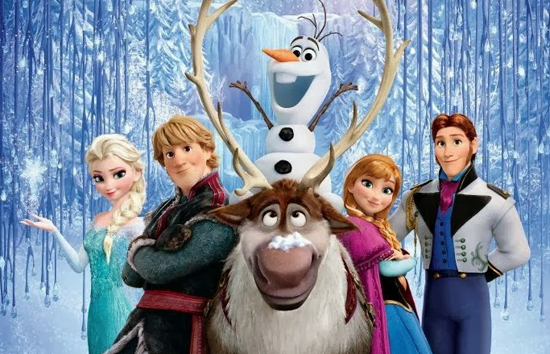 What is the biggest snub of this year’s Oscar nominations? Some might say that that Tom Hanks not being nominated for his outstanding work in either Captain Phillips or Saving Mr. Banks. Others might say Emma Thompson for her work in that latter movie.
What is the biggest snub of this year’s Oscar nominations? Some might say that that Tom Hanks not being nominated for his outstanding work in either Captain Phillips or Saving Mr. Banks. Others might say Emma Thompson for her work in that latter movie.
For me, the biggest snub is Frozen not getting a Best Picture nominations. Yes, I do know that it got a nod for, and most likely will win Best Animated Feature, but there are times when the same film has been nominated for that category and the more prestigious Best Picture (2009’s Up) when the film was especially deserving. And I believe Frozen was more than deserving.
I recently saw the film for a second time in a theater (one of the side benefits of having a four-year old and Disney’s relentless desire to milk the most money out of their films–this time with a Sing-a-long version) and while I have been a cheerleader for the film to get a Best Picture nomination since I saw it the first time, seeing it again confirmed to me that it was one of the best pictures not just of this year, but any year.
That being said, I felt compelled to list the ten main reasons why Frozen deserved to be nominated for Best Picture, especially with only nine of the ten available spots taken. I don’t expect the Academy to come to their senses and add it to the list of nominees at this late hour, but I do hope this column shows them the error of their ways.
Oh, and since I am going to be going into detail about the film and it’s plot, let me throw one of these up here:
1. The “Do You Want To Build A Snowman?” sequence:
If I had to boil down this list to just one entry, it would be this one.This is the main reason why I am starting off with it. Through the magic of You Tube, we have a look at the full song as it appears in the film:
Since I am not entirely sure this was legally shared with the site (meaning it may be taken down at any time), allow me a bit to explain what the above clip is. This is the song “Do You Want To Build A Snowman?” and it appears early in the film, just after young Elsa accidentally hurt Anna with her powers. The three minute and twenty minute song covers the next decade, give or take, of the character’s lives, with special attention devoted to the major event that changes the characters’ lives forever and kicks the main plot into motion. And it’s nothing short of brilliant.
It calls to mind a similar scene from Up, where Carl and Ellie’s seventy years of being together is summed up in a few minutes of screen time. I was in awe at the mastery of the story telling there, especially at the emotional weight it carried. But I think the Frozen sequence one-ups it. It has more heavy lifting to do. It is still wonderful at telling the story and while it might lose something by being taken out of context, it’s hard not to be emotionally moved by the time the song ends. But it also is essential to the plot of the story, Elsa and Anna’s characterization, and the dynamic of their relationship. It is sheer genius, and it in and of itself makes Frozen worthy of a Best Picture nomination.
2. The film is economy of storytelling at its finest:
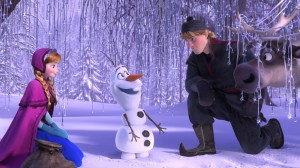 There are a lot of plot elements in this film, a lot of moving pieces, and a lot of plot lines criss-crossing all over the narrative, but it never really seems that complex. The filmmakers make sure everything is presented clearly, so clearly even a child can understand it.
There are a lot of plot elements in this film, a lot of moving pieces, and a lot of plot lines criss-crossing all over the narrative, but it never really seems that complex. The filmmakers make sure everything is presented clearly, so clearly even a child can understand it.
The theory of Chekov’s gun states that if a gun is introduced in the first act, it must be used by the third act. The film is full of so many Chekov’s guns that it should be called Chekov’s armory. Every character trait, every plot point, and every bit of action is well set up before hand. And not in a clumsy, ham-fisted, overly telegraphed way either, but in a way that does not insult the viewers’ intelligence. This shouldn’t be a big deal, but few films do this at all, let alone do it this well.
And the film never feels rushed or hurried. Scenes are allowed to develop. Events work their way out in with a natural pace and flow. The main storyline doesn’t kick in unto at least 15 minutes in, because the storytellers had the confidence to let the events take shape in a logical, realistic fashion.
3. It features complex characters defined by internal and external conflict:
Complex characters in a kid’s movie seems like an oxymoron. But the characters in Frozen are deeper and more three-dimensional (no pun intended) than the ones you’ve seen in 98% of other live-action films aimed at adults that you’ll see this year.
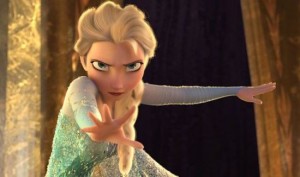 Take Elsa, for instance. She was cursed with ice powers at a very young age. As a result, she must hide what she is, who she is, for her entire life. She must hide from everyone, including her sister–denying Anna the one thing she wants more than anything in the world, companionship–in order to keep them all safe. But the more she hides, the more fear takes hold of her. And the more afraid she is, the worse her control of her powers becomes. And more control she loses, the more danger she is to the ones she loves, so the more reason why she should stay hidden, and vicious cycle continues anew.
Take Elsa, for instance. She was cursed with ice powers at a very young age. As a result, she must hide what she is, who she is, for her entire life. She must hide from everyone, including her sister–denying Anna the one thing she wants more than anything in the world, companionship–in order to keep them all safe. But the more she hides, the more fear takes hold of her. And the more afraid she is, the worse her control of her powers becomes. And more control she loses, the more danger she is to the ones she loves, so the more reason why she should stay hidden, and vicious cycle continues anew.
And that’s only a small part of her journey through the film and she is only one character in the film.Even the comic relief character, Olaf the anthropomorphic snowman, gets an internal conflict (an overwhelming desire to experience summer to its fullest while being made of melt able snow) to showcase the character’s naivete and simple nature.
Having such an array of rich and complex characters typically is a hallmark of a Best Picture nominee, just not in this case.
4. It’s songs are great and vital to the narrative and characterization:
The songs in Frozen have been described dismissively as Broadway-ish, like that should be an insult. The Broadway musical has been around for almost 150 years, and when it works well, words and music mesh together perfectly to help the narrative along and create a unique and stimulating viewing experience.
And if Frozen was a Broadway play (which it will be, someday) it would be one of the better ones. The songs are a valuable part of the film for everything from setting the tone (“The Frozen Heart,” which opens the film) to providing character studies (Kristoff’s “Reindeer Are Better Than People” and Olaf’s “In Summer”) or plot aids (“Love Is An Open Door” and “For The First Time In Forever”). Frozen would be a far lesser film if not for its songs, not just because they are terrific, but because they play such a pivotal part in weaving the narrative.
5. The score provides an emotional undercurrent to the entire film:
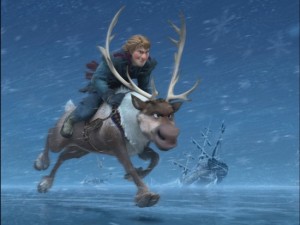 Film scores, when they work, become legendary in and of themselves. Think Psycho. Think Rocky. Think Star Wars. Nothing is better at selling audiences what is on the screen than a finely crafted piece of music playing over the action we’re seeing there.
Film scores, when they work, become legendary in and of themselves. Think Psycho. Think Rocky. Think Star Wars. Nothing is better at selling audiences what is on the screen than a finely crafted piece of music playing over the action we’re seeing there.
Frozen was the first film in while where I actually noticed how much the score added to the story. There are a lot of emotional notes that need to come through during the film, and the score is there to enhance and intensify all of them. I was especially taken by the music that played over the climax. It paired perfectly with what was happening in the film and compelled me to the edge of my seat, literally, on the two times I saw the film. I can’t remember that happening in years.
6. It is visually stunning and superbly directed, the voice acting is spot-on perfect:
 The areas where most live action films get kudos–acting, directing and cinematography–are often deliberately ignored when it comes to animated films. After all, all actors are doing is providing a voice. The animators provide the facial expressions and physical gestures that do the lion’s share of character making. And when all that limits the director is their own imagination and the processing power of the computers they use, how hard can it be to construct sweeping vistas and eye catching scenes?
The areas where most live action films get kudos–acting, directing and cinematography–are often deliberately ignored when it comes to animated films. After all, all actors are doing is providing a voice. The animators provide the facial expressions and physical gestures that do the lion’s share of character making. And when all that limits the director is their own imagination and the processing power of the computers they use, how hard can it be to construct sweeping vistas and eye catching scenes?
Voice acting will never get the proper respect, especially from the Academy, but it is vitally important for any film, especially animated works. Broadway veteran Idina Menzel is able to use just her voice sell Elsa’s inner turmoil and conflict. Kristen Bell uses her voice to expertly capture Anna’s optimism, stubbornness, and nobility. And I really could go on down the line. You cannot imagine anyone but Josh Gad playing Olaf, or Jonathan Goff playing Kristoff or Santino Fontana play Hans and so on. They do much more than just match the words to the character’s lips, they give the character’s depth and soul.
And while directors Chris Buck and Jennifer Lee are helped by the fact that the computer technology enables them to capture scenes that would be physically impossible in the real world with live actors, that doesn’t mean their directing job is any less brilliant than Martin Scorsese or Steve McQueen. Their visuals, and the way they construct their scenes, in Frozen show true creativity and artistry. Note the transition from the graveyard to the castle hallway in “Do You Want To Build A Snowman?” Look at Anna’s choreography during “For The First Time In Forever.” Take notice of the falling ship during Kristoff’s ride back into Arendelle and how he avoids it. Take in the awe and wonder of the castle building scene during “Let It Go.” Then tell me they did not do a fantastic job directing this film.
7. There are messages and morals that abound, for children of all ages:
Being a parent, I take an interest in what morals and messages are presented in the films my daughter sees. And I have to say, I like the messages Frozen sent out.
The way I see it, both sisters serve as examples of what I’d like my daughter to be. Anna is selfless, brave, loyal and kind. Elsa is strong, smart, self-sacrificing, and, after a while, able to overcome her fears. Both are creative and independent and caring. These are all qualities I would love my daughter to exemplify (and, to be honest, she already does). Not all films present such role models.
But you don’t have to be a kid or a parent to see a message in the film. I’m sure we don’t have to think too hard to see how people would identify with someone who has to hide what they truly are to fit into society. And I certainly wish more people would live by the example set in the film of putting others above yourself. Message films do, and arguably, should, get Academy attention. Not this time, though.
8. It is a sly commentary on the “Disney Princess” genre of animated film:
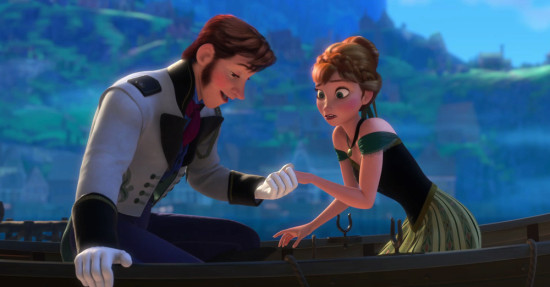 I think that films that have something to say about, or poke fun at the conventions of, their genre they’re set in should automatically get Oscar consideration. Not an automatic nomination, mind you. They should only get that if they do that kind of examination that Frozen does.
I think that films that have something to say about, or poke fun at the conventions of, their genre they’re set in should automatically get Oscar consideration. Not an automatic nomination, mind you. They should only get that if they do that kind of examination that Frozen does.
If you have a child, especially a girl of a certain age, you are probably very familiar with the Disney Princesses. And if you are familiar with the Disney Princess, you are pretty familiar with how their romantic lives go. The women live ordinary, bland lives, hoping every day their prince will come. He does, and even though the spend as much time with each other than you spent with the guy who stood in front of you at the DMV (quite often, even less) they decide to get married and live happily ever after.
And at the onset, it seems Frozen appears to be that kind of film. Princess Anna hopes that the new found freedom she is experiencing would allow her to find the man of her dreams. And it appears that she has found just that in Prince Hans from the Southern Isles. He is charming, handsome, sweet and kind. After a “meet cute” and a span of a few hours talking, they decided to get married. Their holy matrimony is interrupted by Elsa’s accidental display of powers and her running away.
Anna leaves Hans in charge of the kingdom as she chases after her sister, and he takes care of her subjects well during her absence. However, when a dying Anna comes back to the castle for the all-powerful, life-saving “true love’s kiss” from her paramour Hans, he…refuses.
Yes, this particular Prince Charming, who is 13th in line for throne in his own land, was only interested in Anna to become king. And he was only interested in Anna because Elsa wouldn’t give him the time of day. And, well, since he’s going to kill Elsa anyway, might as well let Anna die so he could rule alone.
This is a bold commentary on the “love at first sight” trope of the Disney Princess film, and I admire the heck out of the powers that be behind Frozen for showing us it. And further kudos for showing Anna learning from her mistake and going slower with her true “true love,” Kristoff at the end of the film.
9. It is not afraid of going against the grain, or being irreverent:
 As the above, shows the film was not afraid to play against the conventions of the genre, while all the time working inside it. Hans Christian Andersen’s The Snow Queen was an inspiration for the tale, and trying to do a faithful adaptation of it landed the project in development hell for over 20 years. The way they got it to work was to make the film is so diametrically different from the source that it should actually be considered an original work. Normally, I’m not a fan of this kind of initiative, but here it worked, and worked in spades. And the desire and ability to do something other than the expected continued throughout the film itself.
As the above, shows the film was not afraid to play against the conventions of the genre, while all the time working inside it. Hans Christian Andersen’s The Snow Queen was an inspiration for the tale, and trying to do a faithful adaptation of it landed the project in development hell for over 20 years. The way they got it to work was to make the film is so diametrically different from the source that it should actually be considered an original work. Normally, I’m not a fan of this kind of initiative, but here it worked, and worked in spades. And the desire and ability to do something other than the expected continued throughout the film itself.
For example, dirty adult minds in the crowd might get a rise out of Anna sing about “ballrooms with no balls” or Olaf’s aversion to yellow snow, but those would go over the heads of the kids. But how many Disney princess would debate about whether they were “elated or gassy?” And how many romantic male leads in Disney films would be criticized for preferring to “tinkle in the woods.” These lyrics are not politically correct, are a bit crude, but are silly and funny too. Neither gag would make it into typical kiddie fare. But Buck and Lee aren’t making kiddie fare, they are making family fare–something everyone from one to 101 could enjoy. This is just one small example of the courage had to not be conventional or safe.
10.”Let It Go”:
Hopefully, by now, you’ve heard this song. If not, let me rectify that for you right now:
The song is all but a lock for the Best Original Song Oscar and for good reason–it’s fantastic. It’s such a great song that I heard that President Obama has the National Guards across the country on stand by for Oscar night to quell the inevitable and widespread rioting that will happen just in case it doesn’t win.
All kidding aside, the song as it stands is a song of liberation and release. Comparable to Wicked’s “Defying Gravity” (not by coincidence, also originally sung by Frozen‘s Elsa, Idina Menzel. That woman is a national treasure), it is a song of a woman deciding not to be ruled by what’s expected of her, casting off everything that has been keeping her down. And that is part of what makes it a great song in and of itself.
But what takes the song from being merely great to truly extraordinary is the way it is used in the film. When viewed in context of the movie, it is anything but a song of liberation and release. It is a song of delusion and Elsa lying to herself. Instead of becoming truly free for the first time, she is simply going into an exile of sorts. She has moved to the prison of her room in the castle, to an icy castle of seclusion of isolation. The only difference is she has more rooms to move around in. Yet, this still is not enough to escape her torment. She is not able to hide from her uncontrollable powers. She will be forced to be held responsible for what those powers did in Arendelle and her control over those powers will get worse before they get better. The optimism and bravado she shows in the song is fleeting and transitory. And that makes the song even better.
Why? Because it adds layers of pathos and levels of tragedy to the song. It gives it for more weight and power than it originally had. That is what makes the song a great part of the film, and another reason why the film was Best Picture worthy.
I know that all this is screaming into the wind. I know this article will likely never be read by Academy members, and if they did read it, nothing really will change. But I feel that the world should know the mistake the Academy made by ignoring the film for Best Picture consideration. Luckily, I have a forum to do so. The Best Picture Award should be a celebration of films that excel at all aspects of film making and combine them to create the best product possible. Frozen meets all that criteria and more.






OSCARS 2014: 10 Reasons Why FROZEN Not Getting A Best Picture Nod Was The Year’s Biggest Snub http://t.co/uboN9MVMgH
Do you have 13 years old? Because this cant be serious…
They always get the nominations wrong and often times movies that are clearly better do not win.
Yes. Couldn’t agree more. Thanks for a great article.
Shut. Up.